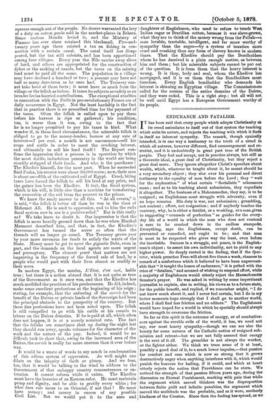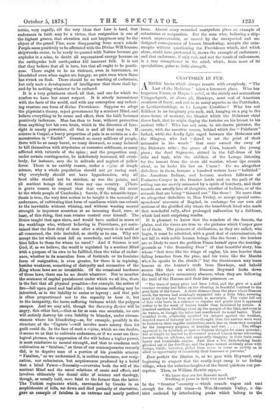ENDURANCE AND FATALISM.
IT has been said that every people which adopts' Christianity at its creed assimilates to itself out of that system the teaching which suits its nature,and rejects the teaching with which it fintils in itself no inherent sympathy. The remark, though cynically intended, is in one way a testimony to the truth of a creed in which all natures, however different, find encouragement and re- straint, and it is undoubtedly in great part true of the British people. They feel and accept, not in practice always, but still at a theoretic ideal, a great deal' of Christianity, but they reject' a great deal more. They ignore altogether Christ's speeches about wealth, which, whatever he taught about it, he meant should be a very secondary object ; they slur over his personal and direct testimony to the equality of men before the Lord ; they "wait for the explanation" of what certain " Socialistic " utterances mean ; and as to his teaching about submission, they repudiate it altogether. The business of a Mahommedan, they say, is to be resigned ; an Englishman must struggle with adversity, even if no hope remains. His duty is war, not submission ; grumbling, not content ; effort, not resignation ; and if anybody teaches the contrary, why, he is either a fatalist, or a weakling, or a man given to suggesting " counsels of perfection" as guides for the every- day life of a world in which the man who does not contend is sure to be crushed down in the endless stampede. Everything, says the Englishman, except death, can be prevented or remedied, and ought to be ; and that man is most to be respected who gives way the least, even before the inevitable. Success in a struggle, not peace, is the English- man's object ; to assert his own individuality, not to yield to any higher power. So deeply rooted is the feeling, that if the Spec- tator, which preaches Free-will about five times a week, chances to remark of a misfortune which it believed to have been unprevent=1 able that " it taught the lesson of endurance," it is pelted with the cries of "fatalism," and accused of wishing to suspend effort, while a majority of Englishmen would utterly reject the Massachusetts Senator's prayer. He was asked in writing by some impertinent journalist to explain, also in writing, his views as to a future state; for the public benefit, and replied, if we remember aright, " I do not know much about it, and I never feel certain, but I do in my better moments hope strongly that I shall go to another World, where I shall find less friction and no editors." The Englishman would have hoped for a world in which he specially should alstayit have strength to overcome the friction.
So far as this spirit is the outcome of energy, or of combativ& ness against the curable evils of the World, it has, We need not say, our most hearty sympathy—though we can see also the beauty for some natures of the Catholic notion of resigned sub- mission and retreat—but we are not fully assured that energy is the root of it all. The grumbler is not always the worker, or the fighter either. We think we trace some of it at least, possibly a good deal of it, to a much lower impulse,—that passion for comfort and ease which is now so strong that it grows destructively angry when anything interferes with it, which would punish the heavens for hailing, if it could, and which at heart utterly rejects the notion that Providence can be stern. We noticed the strength of that passion fifteen years ago, daring the discussion on Eternal Punishment, marking with pain that while the argument which moved thinkers was the disproportion between finite guilt and infinite penalties, the argument which moved the multitude was the probable, and as it were, motherly' kindness of the Creator. Since then the feeling has spread, as we notice, very rapidly, till the very ideas that Law is hard, that endurance in faith may be a virtue, that resignation is one of the highest graces, that elevation and not happiness may be the object of the grand Plan, seem disappearing from men's minds. people seem positively to be affronted with the Divine Will because shipwrecks occur, to be ready to quarrel with Nature because gas explodes in a mine, to doubt all supernatural energy because on the earthquake belt earthquakes kill innocent folk. It is not that they believe that all is love, but that all ought to be gentle- pees. There ought to be no violence, even in hurricanes, no bloodshed even when eagles are hungry, no pain even when flame has struck on flesh. There should be no teaching of endurance, bat.enly such a development of intelligence that there shall by- and-by be nothing whatever to be endured. it is a very gelatinous creed, all that, and one for which we ponfess we have but scant respect. It is utterly inconsistent with the facts of the world, and with any conception any reflect- in; creature can form of divine Providence. Suppose we adopt the physicist's theory, reject government by a sentient Mind, and believe everything to be cause and effect, then the faith becomes ,positively ludicrous. Man has then to bear, without protection from anything but his own brain, which in the direction of fore- sight is nearly powerless, all that is and all that may be. If science is Gospel, a heavy proportion of pain is as certain as a de- menatration in " Euclid." Granted so many millions of people, there will be so many burnt, so many drowned, so many induced to kill themselves with strychnine or corrosive sublimate, so many afflicted with tubercle of the spine ; and the proportion may, under certain contingencies, be indefinitely increased, till every- body, for instance, may die in solitude and neglect of yellow fever. There is no earthly reason, under a regime of simple Science, why a whole population should not go raving mad, why everybody should not have hypochondria, why all food alike should not be stricken, as was the potato, and all sentient beings die out from any one country. (There is grave reason to suspect that that very thing did occur to the whole people of Cambodia.) Surely, if the scientific hypo- thesis is true, the very first notion to be taught is the necessity of endurance, of cultivating that form of manliness which can submit to the inevitable without whining, and without wasting mental strength in impotent scratches at an incoming flood, sure, at least, of this thing, that man retains control over himself. The Stoics taught that ages since, and would have smiled in scorn at the weaklings who, without believing in Providence, yet main- tained that the first duty of man after a shipwreck is to scold at all concerned, the tide included, as shrilly as he can. Why not accept the lot which must fall on somebody, and which had this time fallen to those for whom he cared ? And if Science is not nod, if, as we believe, the world is regulated by a sentient Mind _with a purpose of its own to be fulfilled, then the value of endur- ance, whether in its masculine form of fortitude or its feminine form of ,resignation, is even greater, for there is in repining, besides weakness, something of disloyalty and accusation of the Sing whose laws are so irresistible. Of the occasional hardness of those laws, there can be no doubt whatever. Not to mention the sentence of capital punishment under which we all live, there is the fact that all physical penalties—for example, the action of ore—fall upon good and bad alike ; that intense suffering may be inherited, as in the liability to caries or leprosy ; and that pain
is often proportioned not to the capacity to bear it, but to the incapacity, the horse suffering tortures which the polypus eacapes. And we may add, though the Saturday Review will be angry, this other fact,—that as far as man can ascertain, no care will entirely destroy his own liability to blunder, under circum-
stances where his blundering—as, for example, possibly in the structure of the Captain '—will involve more misery than his guilt could do. In the face of such a regime, which no one doubts, it seems to us that to cultivate endurance, or if we must use theo- logical phrases, the suppression of the will before a higher power, is most conducive to mental strength, and that to condemn such cultivation as "fatalism," as three of our contemporaries recently did, is to deprive man of a portion of his possible armour. " Fatalism," as we understand it, is neither endurance, nor resig- nation, nor submission, but acquiescence produced by a belief that a blind Power—Necessity—overrules both the will of the sentient Mind and the usual relations of. cause and effect, and involves ultimately the denial alike of science and theology, thongh, as usually held, more fatal to the former than the latter. The Tartish regiments which, surrounded by Greeks in an Amphitheatre of hills, sat down and died patiently of starvation, pre an example of fatalism in an extreme and liear17 perfect
form. Almost every recorded martyrdom gives an example of submission or resignation. But the man who, believing a ship- wreck unpreventable, or caused by the unexpected and un- designed consequences of human blundering, accepts the cata- strophe without questioning the Providence which, and which alone, could have prevented it, shows the example of endurance ; and that endurance, if only real, and not the result of callousness, is a true strengthener to the mind, which, from most of its speculations, gains so little strength.



































 Previous page
Previous page